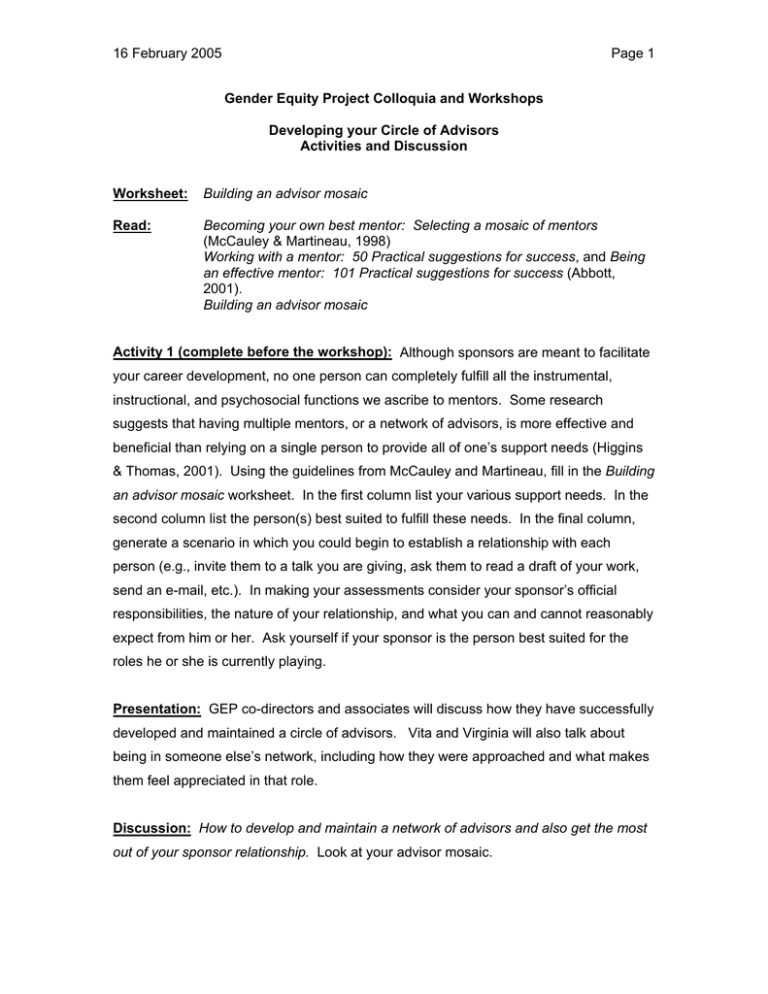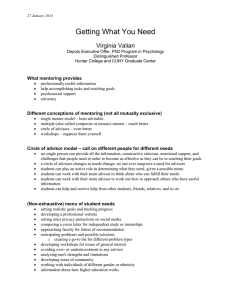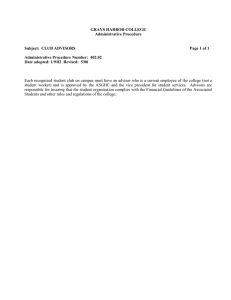16 February 2005 Page 1 Gender Equity Project Colloquia and Workshops
advertisement

16 February 2005 Page 1 Gender Equity Project Colloquia and Workshops Developing your Circle of Advisors Activities and Discussion Worksheet: Building an advisor mosaic Read: Becoming your own best mentor: Selecting a mosaic of mentors (McCauley & Martineau, 1998) Working with a mentor: 50 Practical suggestions for success, and Being an effective mentor: 101 Practical suggestions for success (Abbott, 2001). Building an advisor mosaic Activity 1 (complete before the workshop): Although sponsors are meant to facilitate your career development, no one person can completely fulfill all the instrumental, instructional, and psychosocial functions we ascribe to mentors. Some research suggests that having multiple mentors, or a network of advisors, is more effective and beneficial than relying on a single person to provide all of one’s support needs (Higgins & Thomas, 2001). Using the guidelines from McCauley and Martineau, fill in the Building an advisor mosaic worksheet. In the first column list your various support needs. In the second column list the person(s) best suited to fulfill these needs. In the final column, generate a scenario in which you could begin to establish a relationship with each person (e.g., invite them to a talk you are giving, ask them to read a draft of your work, send an e-mail, etc.). In making your assessments consider your sponsor’s official responsibilities, the nature of your relationship, and what you can and cannot reasonably expect from him or her. Ask yourself if your sponsor is the person best suited for the roles he or she is currently playing. Presentation: GEP co-directors and associates will discuss how they have successfully developed and maintained a circle of advisors. Vita and Virginia will also talk about being in someone else’s network, including how they were approached and what makes them feel appreciated in that role. Discussion: How to develop and maintain a network of advisors and also get the most out of your sponsor relationship. Look at your advisor mosaic. 16 February 2005 Page 2 1. How many of your support needs are currently being met by your sponsor or someone in your circle of advisors? 2. For how many were you able to identify a potential advisor? 3. For how many are you unsure who you can turn to? 4. Does your circle include peers? Departmental colleagues? Other Hunter colleagues? People from other institutions? People from other disciplines? People outside academia? 5. How did you first establish connections with your advisors? 6. How has your circle of advisors or your relationship with your sponsor changed as your needs have changed? 7. What do you think is most successful for keeping these relationships effective? Activity 2: Using the ideas presented in the discussion, work in groups of three to write down a concrete plan to add at least one more person to your circle of advisors: draft an e-mail, plan a phone call, or rehearse an introduction at an upcoming meeting. Site Visit Discussion: The GEP is preparing for our NSF site visit in April and we’d like your help. We want to talk about the impact of the sponsorship program on your careers. What lessons learned from workshops have you applied? What have you shared with others? How has your role in your department or the college changed as a result of being in the sponsorship program? References Abbott, I. O. (2001). Working with a mentor: 50 practical suggestions for success. Washington, DC: National Association for Law Placement. Abbott, I. O. (2001). Being an effective mentor: 101 practical strategies for success. Washington, DC: National Association for Law Placement. Higgins, M. C. & Thomas, D. A. (2001). Constellations and careers: toward understanding the effects of multiple developmental relationships. Journal of Organizational Behavior, 22, 223-247. McCauley, C. D. & Martineau, J. W. (1998). Reaching your developmental goals. Greensboro, NC: Center for Creative Leadership Press. GEP - Activities and Discussion: Developing your Circle of Advisors 16 February 2005 GEP - Activities and Discussion: Developing your Circle of Advisors Page 3



